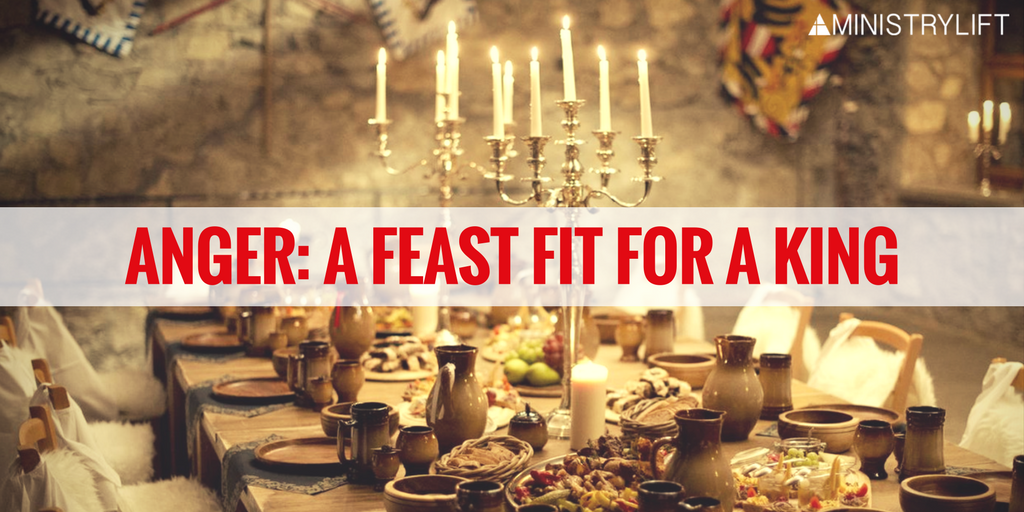Anger: A Feast Fit for a King
 The last time I heard a preacher speak on the topic of anger may have been the last time I made a confession about being angry. I’m not claiming my life has been free of anger since then nor am I pointing my finger at the pastors I’ve been listening to. I’m simply saying it’s been a long time. Long enough to wonder what it means to be angry. Long enough to admit that I rarely consider if my actions are prompted by anger.
The last time I heard a preacher speak on the topic of anger may have been the last time I made a confession about being angry. I’m not claiming my life has been free of anger since then nor am I pointing my finger at the pastors I’ve been listening to. I’m simply saying it’s been a long time. Long enough to wonder what it means to be angry. Long enough to admit that I rarely consider if my actions are prompted by anger.
I know what frustration feels like. I’ve experienced the dreariness of disappointment and the misguidance of envy. But what about anger? What does that look and feel like?
Throughout the Bible, anger is often paired with fire. Anger burns within someone and at times against someone. It is often ignited when needs or desires are threatened or when a person feels they have been treated unjustly. Anger can be sparked in an instant and it carries the potential for collateral damage.
Some people claim anger is the culprit for their destructive actions, but this is a scapegoat that does not lead to a lasting solution. Furthermore, anger can be a catalyst for helpful change if it is applied constructively and with self-control. Wishing for anger to go away is not only unlikely, it could be unhelpful.
Instances of anger spill off the pages of the Bible, and it is God Himself who is often described as angry. This tells us that anger is not sin. Anger, like every emotion, is neutral—it is neither positive or negative. The key is how a person chooses to respond to their feelings. The distinction between feelings and actions is the interpretative key to understanding and applying Ephesians 4:26: “In your anger do not sin” (cf. Ps 4:4). Our response makes all the difference.
I believe one way we can resist lashing out in anger is to recognize how anger works. We are invited to indulge ourselves with little regard for others. We are coaxed to react in the moment with little consideration for the context. We are tempted to take the fire that is within us and spread it all around.
Years ago, I came across a compelling image for anger that has stuck with me ever since. Most preachers don’t disclose the satisfaction that sinful behaviour promises to deliver, but Frederick Buechner isn’t like most preachers. His stories capture the candid experiences of a man who may have failed to control himself more often than some would care to admit. He is true to his subject because he is true to himself. If we do the same, I believe we'll see that anger often works the same way in our lives.
Of the Seven Deadly Sins, anger is possibly the most fun. To lick your wounds, to smack your lips over grievances long past, to roll over your tongue the prospect of bitter confrontations still to come, to savor to the last toothsome morsel both the pain you are given and the pain you are giving back—in many ways it is a feast fit for a king. The chief drawback is that what you are wolfing down is yourself. The skeleton at the feast is you. [1]
Keith Reed is the Associate Director of MinistryLift at MB Seminary.
1. Frederick Buechner, Wishful Thinking: A Seeker's ABC (New York: HarperCollins), 1993.
